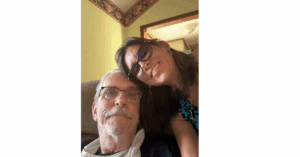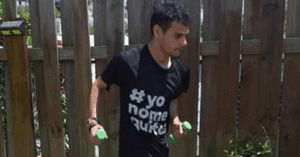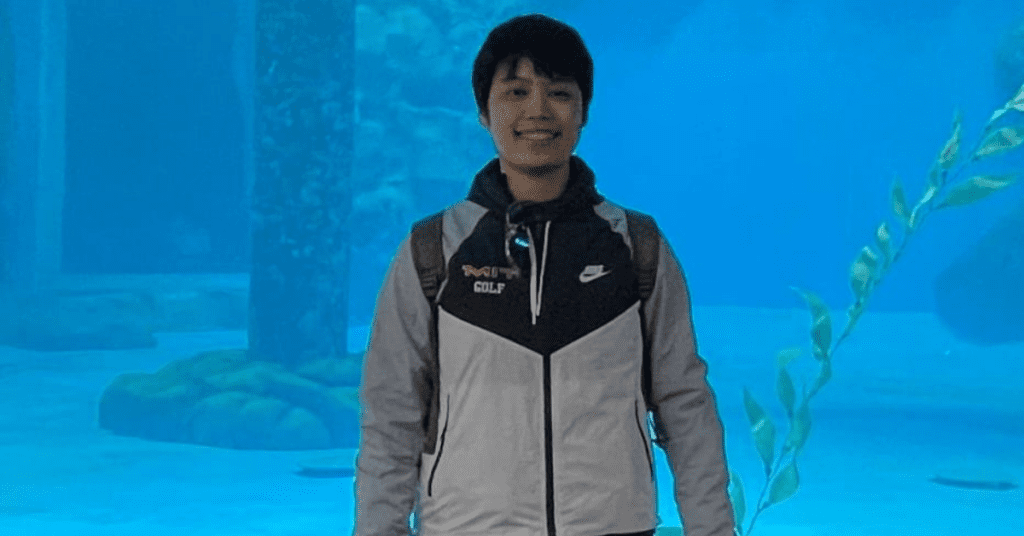My name is CoCo from Hong Kong, and I am an adaptive golfer currently ranked under the World Ranking for Golfers with Disability (WR4GD). I live with Idiopathic Ataxia, a condition that affects my proprioception, coordination, and lower limb control. I walk with elbow crutches. It is a part of my life for which no clear medical cause has yet been found—but its effects are unmistakably real.
I’m sharing my story with the National Ataxia Foundation not only as a competitive athlete but as someone navigating the uncertainties, physical limitations, and mental challenges of living with a rare neurological disorder.
When the Ground Doesn’t Feel Solid, You Learn to Build Stability Within
Before I found golf, I often felt like I was constantly negotiating with gravity. Tasks that seemed effortless for others—walking steadily, reacting quickly, keeping my balance—required tremendous focus and energy.
Golf entered my life at a time when I was searching for a sense of control. The golf swing is a paradox—it demands stillness and explosiveness, softness and strength. For someone with Ataxia, every movement becomes more than a technique. It becomes a training of the nervous system, an act of persistence and precision against unpredictability.
The Meaning of WR4GD in My Life
Being part of the World Ranking for Golfers with Disability (WR4GD) is more than just a title. It’s a commitment to pushing past perceived boundaries and finding belonging in a global community of adaptive athletes. We are not defined by what we can’t do—we’re constantly redefining what we can.
Every practice session, every round, is a form of resistance and resilience. WR4GD gives us visibility—not just as athletes with conditions, but as athletes with potential.
To the Ataxia Community: Sport Is Still for You
One of the greatest misconceptions about Ataxia is that it takes movement away. While it’s true that it changes how we move, it doesn’t take away our right to explore movement in ways that are authentic, expressive, and even competitive.
Golf has become a form of therapy for me—physical, emotional, and mental. It’s where I rebuild confidence, retrain my coordination, and reconnect with joy. I want to encourage others living with Idiopathic Ataxia or any type of movement disorder to look again at sport—not as something lost, but as something that can be reimagined.
Trust the Process. 1% Better Every Day.
This is the principle I live by. On my social media platforms, I share my training, my journey, and the challenges of competing with Ataxia. Not to seek sympathy—but to show what progress can look like: raw, slow, real, and deeply empowering.
We don’t have to move like everyone else. We just have to find the courage to move like ourselves.
Thank you, NAF, for allowing voices like mine to be part of the broader conversation. I hope this story inspires more of us to pick up the tools of motion—whether it’s a golf club, a yoga mat, or a walking stick—and begin rewriting what movement means.
About My Journey
How Has Ataxia Impacted Your Life?
Ataxia has fundamentally reshaped how I interact with the world—physically, emotionally, and mentally. Living with Idiopathic Ataxia means dealing with instability in my movements, poor proprioception, and challenges in coordination, especially in my lower limbs. As an athlete, this condition forced me to reimagine how to train, move, and compete. Yet, it also led me to golf, where I’ve found not just a sport, but a way to retrain my body and mind. It’s made me more intentional, more resilient, and more compassionate toward others navigating invisible challenges.
What is One Thing You’d Like the People to Know About Ataxia?
Ataxia is more than unsteady movement—it’s the daily experience of recalibrating your relationship with gravity, space, and time. For many of us, the challenge isn’t just walking or balancing; it’s being misunderstood, underestimated, or dismissed because the condition is rare and not widely visible. Patients are constantly adapting, and caregivers often carry both the physical and emotional load in silence. I wish more people understood how much courage it takes to face the unpredictability of ataxia and still show up with purpose and grace.
Share Your Advice – How Can Others Support Someone with Ataxia?
The best support starts with listening and believing. Ataxia doesn’t always “look” disabling in obvious ways, but it affects every part of our lives. Encourage people with Ataxia to pursue what they love—sport, art, movement, education—with adaptations that suit their abilities. Offer patience rather than pity. Show up without needing to fix. Let them define their limits—and their possibilities. And always celebrate the effort, not just the outcome.
How has NAF Helped You or Your Family?
The National Ataxia Foundation has given me a sense of validation and community. It’s powerful to know that my journey as an adaptive golfer isn’t isolated—that others are walking parallel paths with their own grit and stories. NAF’s resources, awareness work, and the spotlight they provide to individuals like me help turn a rare condition into a recognized cause. That visibility is everything—it inspires me to keep going, keep swinging, and keep sharing.
Disclaimer: The views and opinions expressed in this story are those of the individual member and do not necessarily reflect the views of the National Ataxia Foundation (NAF). Any medical information shared in this story is based on personal experience and has not been reviewed or endorsed by NAF or a medical professional. Always consult with your own physician or qualified healthcare provider before making any changes to your care or treatment plan.
What is Your Ataxia Story?
As an organization dedicated to improving the lives of those affected by Ataxia, we believe that each story has the power to inspire, connect, and empower others. We invite you to share your personal Ataxia journey with us.
Are you here to read the personal stories, but haven’t yet joined as a member? We hope you find comfort in reading about the experiences of others on their Ataxia journey. We invite you to join as a member to receive a new member story each month. It’s free, and you’ll be kept up-to-date on the latest developments in the Ataxia community.
Recent Member Stories

Keith Heiken
I am 62 years young. I was diagnosed with SCA8 when I was 24. Dr. Byrd took a skin sample to help with other types Read More…

Sarah Altis
It started about 12 years ago. My dad was diagnosed with Ataxia. I wasn’t really sure what that meant, but I spent the next several Read More…

Bella
I’m Bella and from China, thanks to this platform so I could share my story here. My diagnosis was very easy, not that complicating. I Read More…

Michal
Hello Everyone, I’m a pharmacist and have been living for half a century. I learned about my wife’s Ataxia in October of this year. I Read More…

Christian Lopez Trenche
MIRACLE OF LIFE While it’s true that man’s worst enemy has for many years been war, the war I laugh at is the war of Read More…

Brenda C
As a 28-year veteran special education teacher at Vandercook Lake Public Schools, I was looking forward to retiring in 2018. I had plans on working Read More…




